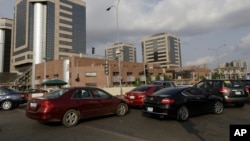The Nigeria Labor Congress (NLC) has called off the nearly week-long strike over an increase in fuel prices and electricity taxes.
The union went on strike last week after the government raised the price of a gallon of gasoline from 86.50 naira ($0.43) to 145 naira or $0.73.
The unions vowed their members would not return to work unless the government rescinded what they called “the astronomical increase in the pump price and the hardship they portend for Nigerian masses”.
The government said it recommended the increases to end shortages caused by the foreign exchange crisis.
Ayuba Wabba, president of the Nigerian Labor Congress says the decision to suspend the strike was made Sunday by the union’s national executive council following the intervention of what he called some well-meaning Nigerians.
“We have called off the strike and the national protest arising from the intervention of some well-meaning Nigerians. First, the National Assembly, the Senate and the House of Representatives, but also leader of the ruling All Progressive Congress [party] whom as you are aware led a very powerful delegation to the secretariat of the Nigerian Labor Congress located in Abuja on Friday,” he said.
He said the parliamentary delegation pleaded with the union to end the strike and allow for negotiation and a peaceful process of resolution.
Wabba denied the union called the strike off because it did not have the desired impact nationwide. He defended the strike action, saying it was taken in the best interest of the poor and the weak.
“First, you that when we strikes is to create the platform for people to engage the policy. We have created that platform; we have done street protests and the argument has been well captured and advanced. That’s the essence of our action because once policies are not good we have a right as citizens to protest those policies, and that’s what NLC has done consistently,” Wabba said.
He said the Labor Congress will continue to push for changes to what he calls the “unjustified and illegal hike in electricity tariff and increase in the pump price of petroleum products” and the hardship they have had on poor Nigerians in the wake of low wages.
“We went on the strike and protest action on two issues. One, the hike in electricity rate by almost 65 percent and the second issue of the hike in the pump price of PMS with almost 67.6 percent. When you look at the two issues, the expenditure has actually gone up, but I think the purchasing power of ordinary workers has remained very static and therefore is something that is not affordable,” Wabba said.
He also said the strike drew attention to the dangers of the government’s reliance on the importation of petroleum products as a sustainable strategy.
“We have to be very consistent in driving issues that we are passionate about. As you rightly said in 2011, in fact we have signed agreement with government to say they needed a moratorium period of four years to actually work on fixing the refineries. More than six years down the line, we are still at the same point,” Wabba said.
Wabba said until the issue of fixing Nigeria’s refineries is resolved, the Labor Congress will continue to hold strike actions.
He urged the government to play by the rules of its engagement with its constituent parts as proof of its commitment to deepening Nigeria’s democracy.




